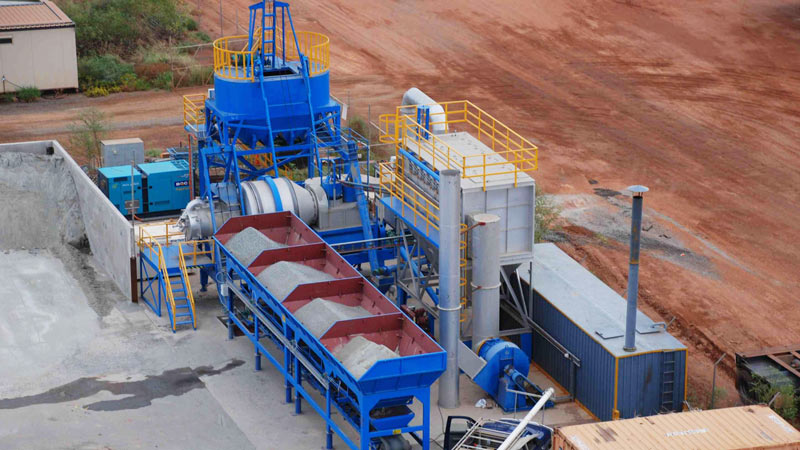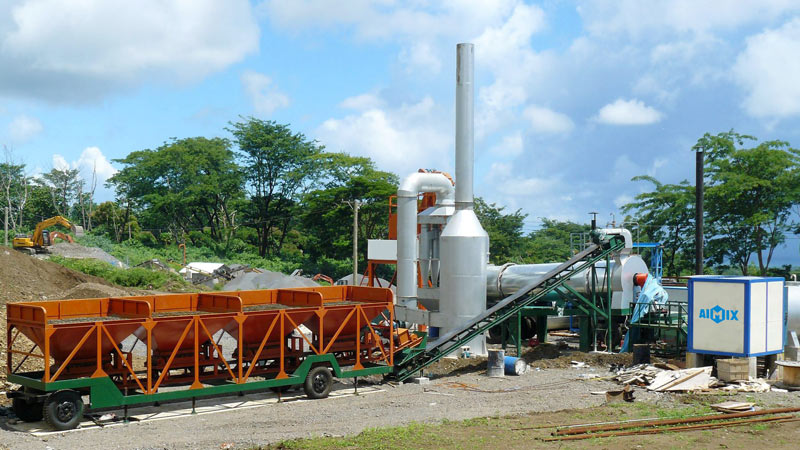Asphalt production is a critical component in many construction projects, from road paving to parking lot repairs. However, for small and medium-sized contractors, investing in large, fixed asphalt plants can be impractical and costly. This is where mini asphalt plants come into play. Designed to provide flexibility, mobility, and cost-efficiency, mini asphalt plants are an ideal solution for contractors working on small to medium-sized projects.
This article will explore the benefits of mini asphalt plants(plantas de asfalto pequñas) and how they offer flexibility for contractors. We’ll also look at how these compact units compare with mobile and continuous asphalt plants, making them a perfect choice for growing businesses.

What is a Mini Asphalt Plant?
A mini asphalt plant is a smaller, more compact version of a traditional asphalt mixing plant. It is specifically designed for small to medium-scale projects, allowing contractors to produce asphalt efficiently without the need for large-scale equipment. Mini asphalt plants are typically mobile, meaning they can be easily transported from one job site to another, providing flexibility in various project environments.
These plants contain all the necessary components for producing asphalt, including aggregate feeders, mixing drums, and storage silos. Despite their smaller size, mini asphalt plants can still produce high-quality asphalt, making them a reliable option for many contractors.
Advantages of Mini Asphalt Plants for Small and Medium Contractors
Mini asphalt plants offer a range of benefits, especially for contractors who handle smaller projects. Let’s take a closer look at the specific advantages these plants bring to the table.
1. Cost-Effectiveness
One of the biggest advantages of using a mini asphalt plant is its cost-effectiveness. Large, fixed asphalt plants require significant upfront investment, which may be out of reach for smaller contractors. Mini asphalt plants are more affordable, allowing contractors to purchase their own equipment without breaking the bank. Additionally, the lower operating costs of mini plants help businesses save money on fuel and maintenance, making them an attractive option for budget-conscious contractors.
For medium-sized contractors looking to expand their operations, investing in a mini asphalt plant is a practical way to boost capacity without incurring the high costs associated with larger equipment.
2. Flexibility and Mobility
The mobile asphalt plant(La planta de asfalto móvil) feature of most mini units is another key benefit. Because these plants are portable, contractors can easily move them between job sites, making them ideal for businesses that take on multiple projects in different locations. This level of mobility allows contractors to be more responsive to their clients’ needs, delivering high-quality asphalt right where it’s needed, without relying on external suppliers.
Furthermore, mobile mini asphalt plants are relatively easy to set up and dismantle, allowing contractors to start and finish projects more quickly, further enhancing their operational flexibility.
3. Quick Return on Investment (ROI)
With lower upfront costs and efficient production capabilities, mini asphalt plants offer a quick return on investment. Contractors who invest in mini plants can immediately reduce their reliance on third-party suppliers for asphalt materials, thus saving on purchase and delivery costs. Additionally, because they are able to produce asphalt on-demand, contractors can take on more projects, increasing their overall profitability.
Small to medium-sized contractors can see a faster ROI with a mini asphalt plant compared to purchasing or leasing larger, more expensive equipment.
4. Consistent Asphalt Quality
While mini plants are smaller in scale, they don’t compromise on the quality of asphalt produced. These units are equipped with the same mixing capabilities as larger plants, ensuring a consistent and high-quality asphalt mix. This is crucial for contractors who need reliable materials for their projects, whether it’s road paving, driveway resurfacing, or small-scale infrastructure development.
Mini asphalt plants allow for better control over the production process, ensuring that the correct proportions of aggregates, bitumen, and filler materials are used for each batch. The result is a uniform and durable product that meets industry standards.

Comparison of Mini Asphalt Plants with Other Types
While mini asphalt plants offer numerous benefits, it’s important to compare them with other types of plants such as continuous asphalt plants and mobile plants to understand their specific advantages and limitations.
Mini Asphalt Plant vs. Continuous Asphalt Plant
A continuous asphalt plant operates continuously, producing asphalt in a steady flow rather than in batches. Continuous plants(Plantas de asfalto continuas) are ideal for large projects that require a constant supply of asphalt. However, they tend to be larger and more expensive than mini plants, making them less suitable for small and medium-sized contractors.
For contractors focused on smaller projects, mini asphalt plants provide the flexibility of producing smaller, controlled batches as needed. This ensures that no asphalt is wasted and that production can be adjusted according to project requirements.
Mini Asphalt Plant vs. Mobile Asphalt Plant
While mobile asphalt plants are designed for portability, mini asphalt plants offer a similar level of mobility but with a smaller footprint. Mini plants can be transported just as easily as mobile units, but they are specifically designed for small to medium-scale projects. Mobile asphalt plants are typically larger and more suited to medium to large-scale operations that require higher production capacities.
For contractors who handle a variety of projects, from small driveways to road repairs, a mini asphalt plant provides the versatility and ease of movement that a full-scale mobile asphalt plant might not offer.
Ideal Applications for Mini Asphalt Plants
Mini asphalt plants are highly versatile, making them suitable for a wide range of applications. Here are a few scenarios where these compact units excel:
- Residential Driveways: For contractors working on small paving projects like driveways, a mini asphalt plant can produce just the right amount of asphalt, ensuring cost savings and timely completion.
- Road Repairs: Mini asphalt plants are perfect for road repairs and maintenance in areas where transporting asphalt from a distant plant would be inefficient.
- Parking Lots: Small to medium-sized parking lot projects benefit from the flexibility of mini asphalt plants, which can be moved to different locations as needed.
- Rural Infrastructure: In rural areas with limited access to large asphalt mixing plants(AIMIX plantas mezcladoras de asfalto), mini asphalt plants provide an affordable and mobile solution for paving roads, airstrips, or community infrastructure.
Conclusion
For small and medium-sized contractors, the mini asphalt plant offers a practical and cost-effective solution for producing high-quality asphalt on-site. With its flexibility, mobility, and consistent asphalt output, it’s no surprise that these compact units are gaining popularity in the construction industry. Whether you’re managing small residential projects or tackling road repairs, a mini asphalt plant provides the perfect balance of affordability and efficiency, helping contractors complete projects on time and within budget.
If you’re a contractor looking to expand your asphalt production capabilities, consider the versatility and advantages of a mini asphalt plant for your next project.